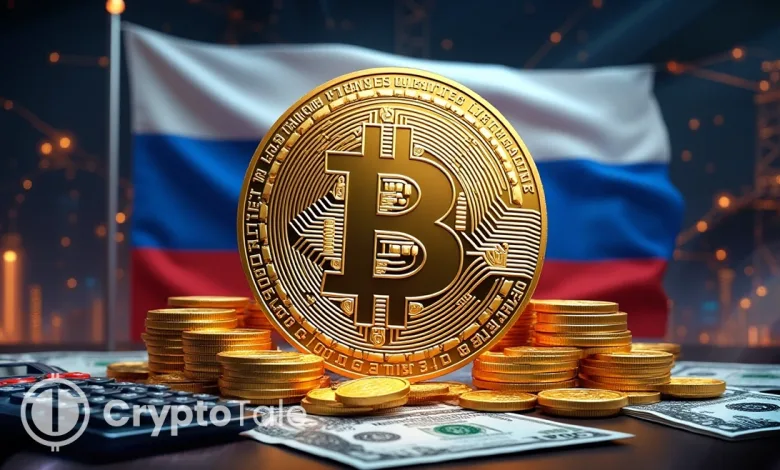Russia Set to Legalize Crypto for Global Trade Deals

- Russia to legalize crypto payments for foreign trade under new financial regulations.
- Over 2.5 trillion rubles in crypto holdings highlight the growing adoption of digital assets.
- 2026 is expected to mark Russia’s rollout of a comprehensive crypto regulatory framework.
Russia is preparing to legalize cryptocurrency payments for foreign trade following a major policy agreement between its Ministry of Finance and the Central Bank. The announcement came during a government strategy meeting led by Finance Minister Anton Siluanov, who confirmed that new legislation will bring digital assets under formal regulation to enhance oversight and efficiency in international transactions.
A Joint Move Toward Legal Regulation
According to Finance Minister Anton Siluanov, both the Ministry of Finance and the Central Bank of Russia reached an understanding to authorize crypto use in cross-border settlements. Speaking at the “Improving Economic Efficiency and Ensuring Equal Business Conditions” session, Siluanov explained that this step is crucial for establishing legal clarity in a sector operating without comprehensive regulation.
He stated that digital payments have already been taking place informally and emphasized that legalization will allow authorities to ensure transparency and order. The minister added that with support from Rosfinmonitoring and other supervisory agencies, the government will develop mechanisms to track transactions and prevent illicit financial activities.
This follows years of restrictive financial conditions under international sanctions, which have limited Russia’s access to major global banking networks. By legitimizing crypto for trade, officials aim to provide local companies with alternative payment channels that bypass traditional financial intermediaries.
Growing Domestic Adoption Fuels Legalization
Many Russians and local companies are already using digital currencies for trade, and the government’s move to legalize them simply confirms this reality. According to Evgeny Masharov, head of the Association of Forex Dealers (SRO AFD), Russian citizens and businesses together now hold more than 2.5 trillion rubles’ worth of cryptocurrencies. He also noted that 2026 could mark the beginning of balanced regulation in Russia’s crypto market.
Masharov’s comments show how digital assets have become integral to Russia’s foreign trade operations. Many companies have been settling payments in crypto with partners outside Western markets to reduce reliance on currencies such as the U.S. dollar or the euro. This approach has allowed businesses to maintain trade continuity despite financial restrictions.
The trend aligns with other nations experimenting with crypto-based trade systems. For instance, Iran has previously used cryptocurrencies to pay for imports, offering a similarity to Russia’s efforts to develop independent settlement mechanisms.
Russia’s Global Crypto Transactions
Before the new rules came in, Russia had already started trying out cryptocurrency for international trade through a special program approved by the Central Bank. This program lets a few selected importers and exporters pay for goods and services using digital currencies, while every transaction is carefully watched by financial authorities.
However, the program was limited to “qualified investors,” which meant that most of Russia’s roughly 20 million crypto holders couldn’t take part. Top executives from major banks like Sberbank and Alfa-Bank have since called on regulators to open up the system so more people and businesses can use it.
From July 2024 to June 2025, Russia handled more than $376 billion worth of crypto transactions, the highest amount in Europe, showing how widespread digital asset use has become in the country. This growing engagement shows why policymakers are formalizing regulation to integrate cryptocurrencies safely into the broader financial system.
Finance Minister Siluanov noted that legalization will not only facilitate trade but also address concerns about capital movement abroad. He stressed that the government’s goal is to create an orderly environment where crypto use supports economic activity without undermining financial stability.
Related: Russia Plans Crypto Bank to Regulate Market and Boost Budget
Controlled and Transparent Crypto Market
While regulators are set to permit crypto for foreign trade, authorities are cautious about its domestic use as a payment method. The Central Bank still restricts the general circulation of cryptocurrencies within Russia’s economy but acknowledges their role in cross-border commerce.
The Ministry of Finance aims to collaborate with the Central Bank and Rosfinmonitoring to draft legislation establishing clear procedures for crypto transactions in trade. These measures will include stricter compliance checks and monitoring to prevent money laundering or illegal transfers.
By aligning regulatory outlook with current market realities, Russia appears to be moving from experimental use to structured adoption. The anticipated 2026 rollout of comprehensive rules may be a turning point for the nation’s crypto sector.
Russia’s decision to formalize crypto payments for international trade is a coordinated strategy between its financial authorities. It is a change from restrictive oversight to controlled integration, suggesting that digital assets are becoming an essential instrument in sustaining the country’s external economic operations.




